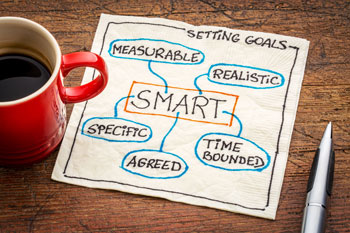Goal Setting: Reflecting on the Authentic YOU

For many, with the New Year comes time to set resolutions – resolutions to do better, to change something about ourselves or our behaviors. So when thinking about resolutions, it is essential to first take a step back and reflect on where we are in the present before throwing out one of the usual – more general goals – like lose weight, eat healthier, quit smoking, have more fun, get a promotion, or exercise more. Many take for granted this “token” resolution; often just spouting what comes to mind when asked about their resolution. Sound familiar? Other key aspects are to be specific when setting goals and to find your own accountability.
So, how do we accomplish this?
Reflect with Authenticity
How often do you take time to reflect on your life, any aspect really, and in a way that is authentic? What actually does it mean to be authentic?
We are flooded by information and news 24/7. We live in a world of reality television and are bombarded by media (including social media and commentary) that has great potential to influence our thoughts and behaviors. It can be hard sometimes to decipher what we think or feel about certain topics.
On top of all that, layer on the “busy” factor. We simply do not often give ourselves time to just be with our thoughts, our visions, our feelings and emotions. We may unknowingly look outside of ourselves for our sense of self and what we want. Being authentic comes from spending time and attention learning about your true self and learning to do your best to live according to who you know yourself to be, through your thoughts, words and actions.
To help you move in the direction of your goals and aspirations, set some time aside for you to reflect and learn more about what is important to you. Ask yourself: What does being healthy look like to you? And… why do you want to be healthy? What matters most to you? What brings you joy and happiness?
Next, acknowledge what you do now to take care of yourself and improve your overall health (mental, physical and emotional). Give yourself credit for what you do and the successes you want to maintain! Write down what you do for yourself on a daily, weekly, monthly, yearly, or as-needed basis. Also take note of how those actions affect you or the rest of your day.
Visualize the healthy you
Imagine yourself in your perfect, ideal world – a future version of yourself who is enjoying optimal health and wellbeing, living life to the fullest. Close your eyes and feel… using all your senses… what this feels like for you and simply take notice.
- What activities do you enjoy when you are in a state of optimal health and wellbeing?
- Who is with you? Where are you?
- What do you look like?
- How would your life look differently if you were healthier?
- What inspires you about this vision of optimal health and well-being?
- If you don’t change anything, how do you see your health in 1, 5, 10 years? How does this compare to your optimal health vision?
Set Goals and Own Them
Based on your vision and self-care needs, set a goal or goals, but try to limit to three goals or less at a time. When setting goals or action steps for new self-care practices it is important to make sure they are SMART: Specific, Measureable, Action-oriented, Realistic, and Timed. Once you are in the “maintenance” stage, you can revisit this process and either refine, revise or add on to the goals you have set.
And, determine how you want to be accountable to yourself. Consider what has worked well for you in the past. Below are some strategies to establish accountability.
Write down your goals. Documenting your SMART goals helps you be clear and intentional. It can also be helpful to write them on sticky notes and put them in different places that will help serve as a reminder to you (i.e. on your refrigerator, on your nightstand, on your bathroom mirror, or at work).
Use technology effectively. Set reminders to practice your healthy behaviors, or simply set the chime to remind you to care for yourself – whatever that may look like for you.
Tell others. Share your specific goals with your family and friends, co-workers, and your healthcare provider. They can help you stay accountable.
Be prepared. To successfully make lifestyle changes, it can also help to think about any potential challenges you may face. Then, create back-up plans.
Now, you are ready for action. Remember, you do not need to wait for the first of the month, or a Monday morning. Living well is a practice. Be reflective and be fluid to adapt as your needs and goals evolve. There are no rules.
In this New Year, I challenge each of you to: set aside time to reflect, be curious, be kind (to yourself and others), show up and be your authentic you.
Rita Karapurkar Williams, MA, CHES, is a Health Coach at Beebe HealthyBack. She has a Master’s degree in Health Education from Teachers College, Columbia University and is a Certified Health Education Specialist. She is currently in the process of becoming a certified Integrative Health Coach through the Arizona Center for Integrative Medicine.
